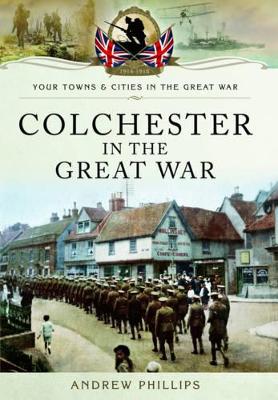Your Towns & Cities in the Great War
1 total work
Few towns equalled Colchester in their role in the Great War. In this expert account, Colchester historian Andrew Phillips records four of the most dramatic years in the town's history. As Headquarters of Eastern Region, Colchester's garrison supplied many of the men who prevented the early defeat of France. The town then became a training area for at least 100,000 recruits. While training, guns on the Western Front could often be heard. At times Colchester's civilian population of 40,000 was equalled by 40,000 troops, who often billeted with local families or housed in large tent cities, which then became hut cities. With 20,000 troops to feed on average, long food queues became a daily experience until rationing was introduced, and soon thousands of requisitioned horses, trucks, artillery pieces and munitions were also assembled in the town. As the war took its deadly toll, Colchester became one vast hospital as the wounded arrived by train. An enlarged garrison hospital, an enlarged civilian hospital and six Red Cross Hospitals nursed at least 110,000 men. Colchester women made huge quantities of bandages, splints and gowns to alleviate the suffering of the war wounded.Colchester factories produced uniforms, guns, shells, mines, compressors and engines.
Paxman's, the largest firm of the town, produced a staggering 20 million precision-machined parts. Over 10 per cent of Colchester's adult men died in the conflict, the highest in eastern England and twice the national average. Small wonder the town built one of the finest civic war memorials in England.
Paxman's, the largest firm of the town, produced a staggering 20 million precision-machined parts. Over 10 per cent of Colchester's adult men died in the conflict, the highest in eastern England and twice the national average. Small wonder the town built one of the finest civic war memorials in England.
